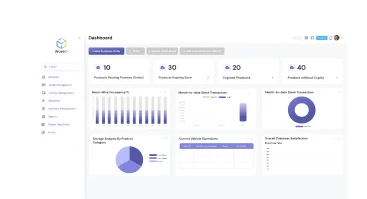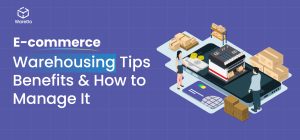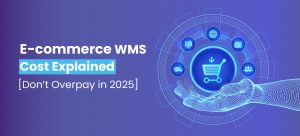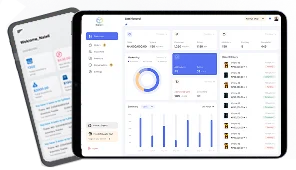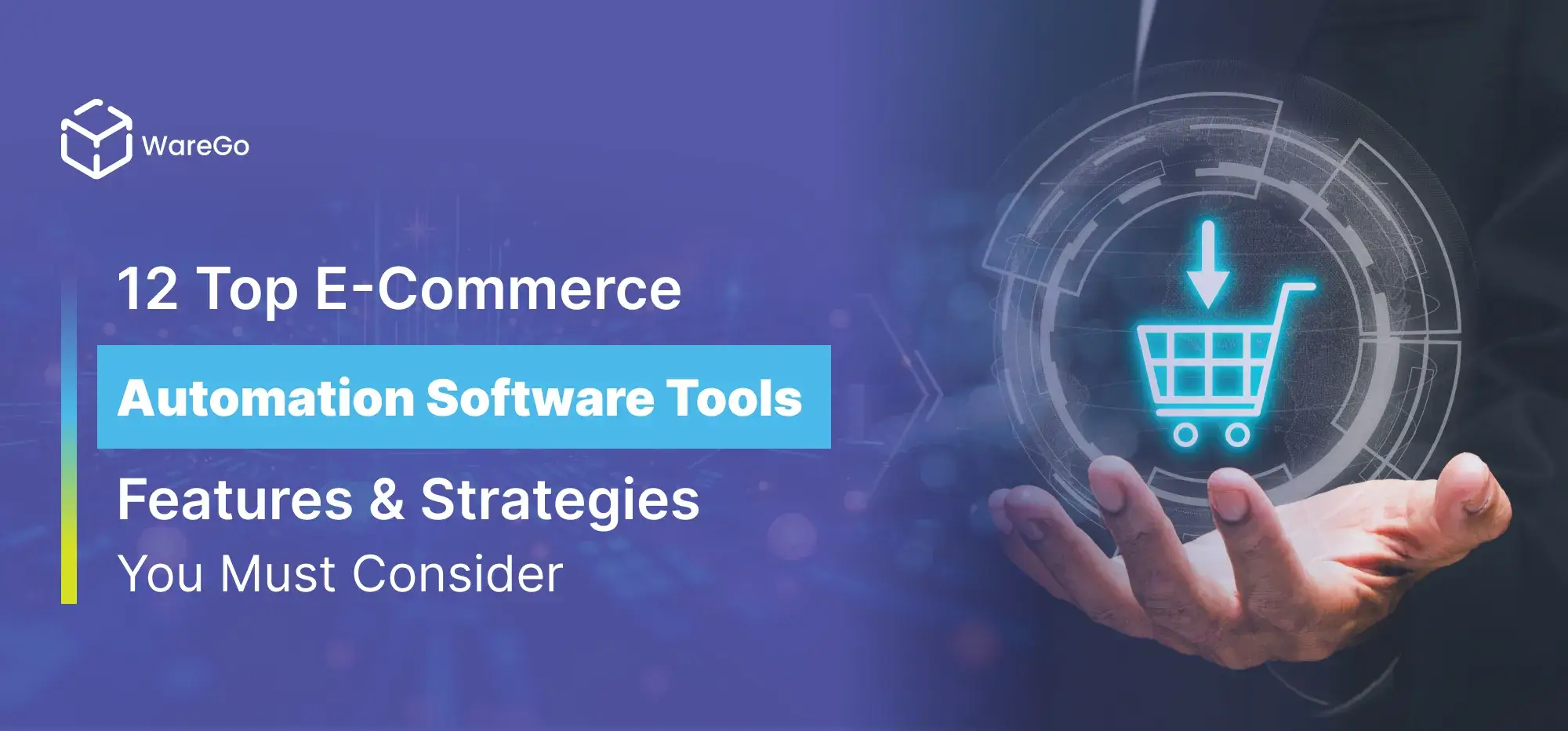
As the e-commerce market continues to grow, technology is rising in e-commerce businesses and helping them to become the heart of success.
However, e-commerce automation software has been on high alert for succeeding in this industry. Automation software is not just a basic software tool; it is a foundation for streamlining daily processes that can otherwise lead to time consumption and errors.
A report confirms that e-commerce sales are projected to increase by $6.8 million, with an online purchase rate of 21% of all retail sales.
This is a significant signal for all startups and large enterprises that the market is shifting towards online shopping, and it’s time to implement an ecommerce warehouse management system that integrates all automation software tools for potential growth.
In this blog, we will learn about 12 top e-commerce automation tools that will help you grow your business in today’s digital running world. Also, an overview of what automation is and how to choose the best automation software to take your online business to the next level.
Let WareGo help you have the best automation software for your business.
Schedule a Free Consultation Now!Table of Contents
What is E-Commerce Automation Software?
E-commerce automation is a software solution platform to automate everyday and repetitive tasks such as order processing, inventory updates, and more.
These tasks usually occur during the sale of goods and services on online platforms, and automation helps to reduce online errors, but how?
The answer lies in automation software tools that integrate workflows across various tech stacks, such as Shopify, WooCommerce, Magento, or BigCommerce, to minimize online errors.
Businesses can also reduce the costs of annual labor by increasing efficiency in other online areas, such as order processing, customer service, marketing, inventory and project management.
Basic Tools of Automation Software You Must Know About
Before going into details, we need to tell our readers about some basic and essential e-commerce automation platforms for startups or large enterprise owners who are just starting their journey in the online world.
1. Marketing Software Tools
- Marketing tools help e-commerce platforms to streamline marketing tasks.
- Automates manual labor tasks such as running email campaigns, social media posting, and more.
Tools You Can Use in Marketing
Popular tools in marketing are:
- Hubspot
- MailChimp
2. Inventory Management Software
- This software helps track stock levels and orders you get online.
- Inventory management tools track all orders, barcode scanning, and real-time analytics.
Software Companies You Can opt for Inventory Management
- WareGo
- Linnworks
3. Payment Processing Software Tools
- It allows companies to accept payments from customers.
- This software prevents fraud detection and provides a secure checkout experience.
Tools You can use
- Stripe
- Paypal
4. Customer Service Software Tools
- This software gives businesses a seamless customer experience.
- It can help in handling live chats, customer complaints, and feedback surveys.
Tools You Can Use For Customer Service Software’s
- Zendesk
- Freshdesk
12 Top E-Commerce Automation Software Tools
Here, we begin with the 12 top e-commerce automation platforms, providing complete overviews of pros and cons, features, and the businesses that can benefit from this tool.
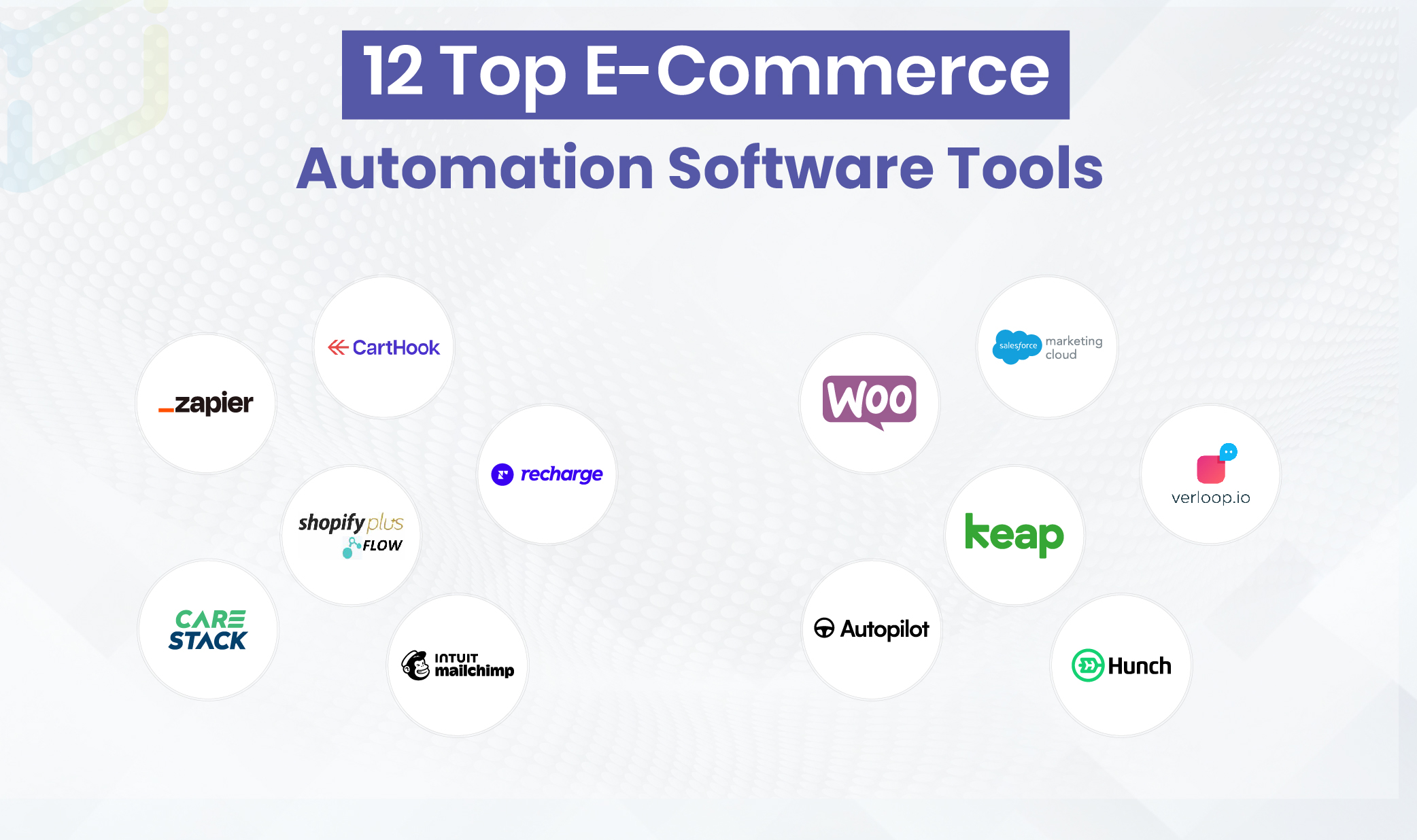
1. CartHook
CartHook is one of the vital automation e-commerce software solutions that helps businesses with their average order volume and creates customizable one-page checkouts.
This software is also considered a revenue optimization software platform due to its post-purchase upsell tool, which allows owners to create offers and discounts for customers based on their shopping cart contents.
Key Features
- Post-purchase upsells and cross-sells to increase order value
- Create post-purchase offers, especially after the initial purchase
- Advanced analysis on funnel performance tracking and optimization
Pricing
- From 0 to 100 orders, it’s free installation
- After 100 orders, it requires a subscription starting from $10 to $250
Disclaimer: The software charges 1% commission as well.
This Software is Ideal For
- Businesses with Shopify Flow and Shopify Plus merchants
- Brands that focus on customer engagement automation
- Stores generating $10k+ monthly, consistent sales
Not Ideal For
- Very small or new startups
- Businesses that are avoiding investing in optimization tools
2. Zapier
Zapier is one of the most powerful e-commerce automation platforms, as it enables businesses to connect and automate tasks without requiring any coding.
This software helps users create connections between thousands of different web applications, including BigCommerce integration, WooCommerce integration, PayPal, and Shopify. These connections allow data to flow between each other to automate repetitive tasks.
Key Features
- Users can customize the connections called ZAPS with web applications according to their e-commerce needs.
- Brands can set triggers and actions for their data flow
- Seamless integration with over 6,000 applications
Pricing
- It’s free for 75 to 100 tasks per month
- The starter plan starts from $19.99 above 750 tasks
- Team plans begin with $69 for more than 2000 tasks
- For enterprise plans, custom pricing is available
Zapier is Ideal For
- Brands that require technical expertise within their organization
- Teams that need more web-application connections without investing in developers
- Business with scaling operations
Not Ideal for
- Businesses with complex or critical workflows
- Those brands that rely on custom in-house software’s
3. Shopify Flow
Shopify is an e-commerce platform automation designed explicitly for Shopify users to save time and streamline workflows.
With the help of this software, merchants can easily create custom workflows to automate tasks on automated ecommerce platforms using a simple interface.
Key Features
- No-code visual editor for building custom workflows
- Give access to ready-to-use templates if needed
- Connects with multiple apps such as Slack, Asana, and other marketing tools
Pricing
- It’s a free automation software tool for Shopify users
- You must have a Shopify Plus subscription to use it
This software is Ideal For
- Shopify merchants with high order volume
- Businesses that desire to automate backend tasks
- Teams looking for a free tool inside Shopify
Not Ideal For
- Businesses with complex automation or advanced synchronization requirements
- Merchants with a regular Shopify plan
4. ReCharge
ReCharge is an e-commerce automation system with subscription management that helps butchers turn into repeat customers.
Brands can easily manage or launch subscription products while offering simple billing options and giving customers control over their accounts. Industries such as beauty, wellness, and food must utilize this software, where repeat purchases drive growth.
Key Features
- Subscription plans to boost average order value.
- Customers can easily add single or exclusive items to their orders altogether
- Builds Free customer portals for easy-to-use carts
Pricing
- Standard plan starts with $99+
- 14-day free trial
Disclaimer: The transaction fee changes according to the plan.
Recharge is Ideal For
- Brands that work on subscription-based businesses
- Businesses focus on customer retention and lifetime value
- Expanding service offerings for a one-stop shop for customers
Not Ideal For
- Brands or companies that don’t have subscription plans
- Businesses without a developer might have to face issues
Explore different e-commerce software and integrations with us
Connect Now!5. CartStack
Cartstack is an e-commerce automation software tool with an innovative design that maximizes the sales of the business by reducing cart abandonment.
This software sends reminders, automated emails, SMS, and various notifications to remind shoppers about the items they left behind in their cart. This reminder process encourages customers to complete their orders.
Key Features
- Sends automated emails and SMS as reminders
- Tracks real-time tracking of customers and their shopping insights
- Have pre-built automation for recovery campaigns
Pricing
- The starting price is $29 per month for up to 1000 visitors
- Pricing can change with visitor volume
This is Ideal For
- E-commerce companies trying to recover sales through reminders
- Stores that want to re-engage their cart-abandoning visitors
- Brands seeking a high ROI tool
Not Ideal For
- Startups and new businesses with limited traffic
- Companies selling a single or unique product
6. Mailchimp
Mailchimp is one of the most powerful ecommerce automation services. This software helps you grow and succeed in digital avenues, such as landing pages, email marketing & more.
This platform offers e-commerce marketers robust personalization, customer insights, and the ability to easily segment customers, which can help drive repeat sales and enhance customer lifetime value.
Key Features
- An easy-to-use drag-and-drop interface
- AI-driven subject line helpers to increase open rates
- Automatically create personalized content within emails based on subscribers’ data
Pricing
- It’s free for up to 500 contacts and 1,000 emails
- The initial plan starts with $13 per month
- The premium plan expands to $350 monthly
Mailchimp is Ideal For
- Bloggers and new startups for marketing and promotions
- Stores looking for an all-in marketing platform
- Brands with no awareness of coding
Not Ideal For
- E-commerce businesses with large, growing customer bases
- Stores that only focus on SMS and CRM workflows
7. AutomateWoo
Automatewoo is an automated ecommerce tool for WooCommerce automation that helps online brands improve customer engagement and recover lost sales.
Merchants can create automated workflows and triggers to streamline activities such as sending follow-up emails, SMS messages, and loyalty program notifications, among others. This process saves merchants time and effort, while providing customers with a fantastic shopping experience.
Key Features
- A robust workflow builder to automate different e-commerce tasks
- Targets inactive customers or those who haven’t shown up in a long time through different campaigns
- Arrange personalized coupons and discounts for customer engagement automation
Pricing
- Yearly subscription starts from $159
- Free trial if you have a WooCommerce marketplace
Automate is Ideal For
- Stores that want affordable automation
- Brands running on subscription models
- Businesses where customers are very important
Not Ideal For
- Non WooCommerce merchants
- Stores where high automation is required
8. Salesforce Commerce Cloud
Salesforce Commerce Cloud is one of the top AI-powered ecommerce tools that combines storefront management, customer personalization, and AI-driven automations.
This e-commerce platform helps businesses allow users to optimize customer interactions, track insights, and streamline online operations with ease.
Key Features
- The software integrates with other market automation platforms
- Employs an AI-driven shopping assistant to provide a seamless customer experience
- Creates a scalable infrastructure to handle high traffic
Pricing
- All pricing is based on GMV (gross merchandise volume and business needs)
- Free demo available
This Software is Ideal For
- Mid to large companies that need global operations
- Brands need AI-driven personalization on websites
- Brands with a unified platform in B2B and B2C
Not Ideal For
- Small businesses requiring a rapid launch
- Brands that have never invested in the Salesforce ecosystem
9. Autopilot
Autopilot is an ecommerce automation platform that helps e-commerce businesses set up automated customer journeys and personalize active campaigns according to customer preferences.
The platform is recognized for its intuitive visual drag-and-drop interface, making it easy for customers without requiring any technical expertise. Autopilot helps target the audience and streamline all marketing operations, leading to improved customer retention.
Key Features
- The software targets customer segments through personalized emails
- Creates monthly A/B testing and analytic reports for companies to optimize their strategies
- Integrates with different platforms such as Shopify, Salesforce, and HubSpot
Pricing
- 14-day free trial available
- Starts from $49, depending on the number of contacts
Autopilot is Ideal For
- Teams wishing to have an easy-to-use automation builder
- Brands running multi-channel selling automation
- Businesses focusing on customer nurturing
Not Ideal For
- Stores with limited marketing needs
- Large enterprise needing advanced customization
10. Keap
Keap is a CRM and sales e-commerce automation software famous for helping businesses collect and convert leads into real customers.
It’s an all-in-one CRM tool that works and manages customer relationships, automates follow-ups, and closes deals for businesses. This process helps owners reduce time consumption and manual tasks, saving them a significant amount of money on marketing campaigns.
Key Features
- All-in-one platform, managing customer data, marketing automation, and lead capture
- Visualizes sales pipelines and tracks deals through different stages
- Arranges built-in appointment scheduling and reminders
Pricing
- Pro plans start from $249 per month
- Max plans go to $329 per month
The software has various plans according to your business requirements.
Keap is Ideal For
- Small or solopreneurs who want sales and marketing automation all in one place
- Brands that ask for a single solution to save time and money
- Teams wanting pipeline management and follow-ups
Not Ideal For
- Large enterprise with complex sales teams
- Companies with a tight budget
11. Hunch
Hunch is an automated ecommerce and ad personalization platform designed for online brands. The software combines AI-driven algorithms with human expertise to achieve maximum results online.
Hunch helps run ad campaigns on Facebook, Instagram, TikTok, and more to recognize your brand among the local public. Not only does this digital commerce automation platform combine dynamic feeds and customer data, it also designs templates and launches them into ads to attract customers.
Key Features
- Automatic bidding optimization, budget management, and real-time data reporting
- Multi-model AI integrations for various tasks
- Tracks and creates reports on the campaigns, and which campaigns run the best.
Pricing
- Prices vary depending on the model you choose for your e-commerce store
- Offers a free demo before the final package
This platform is Ideal For
- Agencies or brands working on paid ads for marketing
- Teams focusing on fast and personalized advertising
- Brands with multiple social media platforms
Not Ideal For
- For large-scale companies with complex advertising demands
- Brands that don’t have social media or digital accounts
12. Verloop.io
Verloop.io is one of the leading e-commerce automation platforms with a conversational AI platform for customer support.
This platform utilizes various tools, including chatbots, live chat, and AI-driven automation, to efficiently manage and address customer queries, providing prompt and positive responses.
Key Features
- Allots AI agents using NLP and machine learning
- The voice of AI listens to customer queries and facilitates real-time voice interaction.
- Tracks and creates reports on support performance and on customer satisfaction.
Pricing
- Custom plans start from $69 to $699, varying according to your needs
- Free demo available
Verloop.io is Ideal For
- Businesses willing to automate their customer service area
- Stores with a high number of customer queries daily
- Brands with multiple channels running together
Not Ideal For
- Brands with advanced reporting and detailed responses to customers
- Organizations that don’t have primary channels for customer service
Tips on How to Choose Your E-Commerce Automation Software
Here is a concise list of tips on how you can choose an e-commerce automation software tool according to your business needs and requirements.
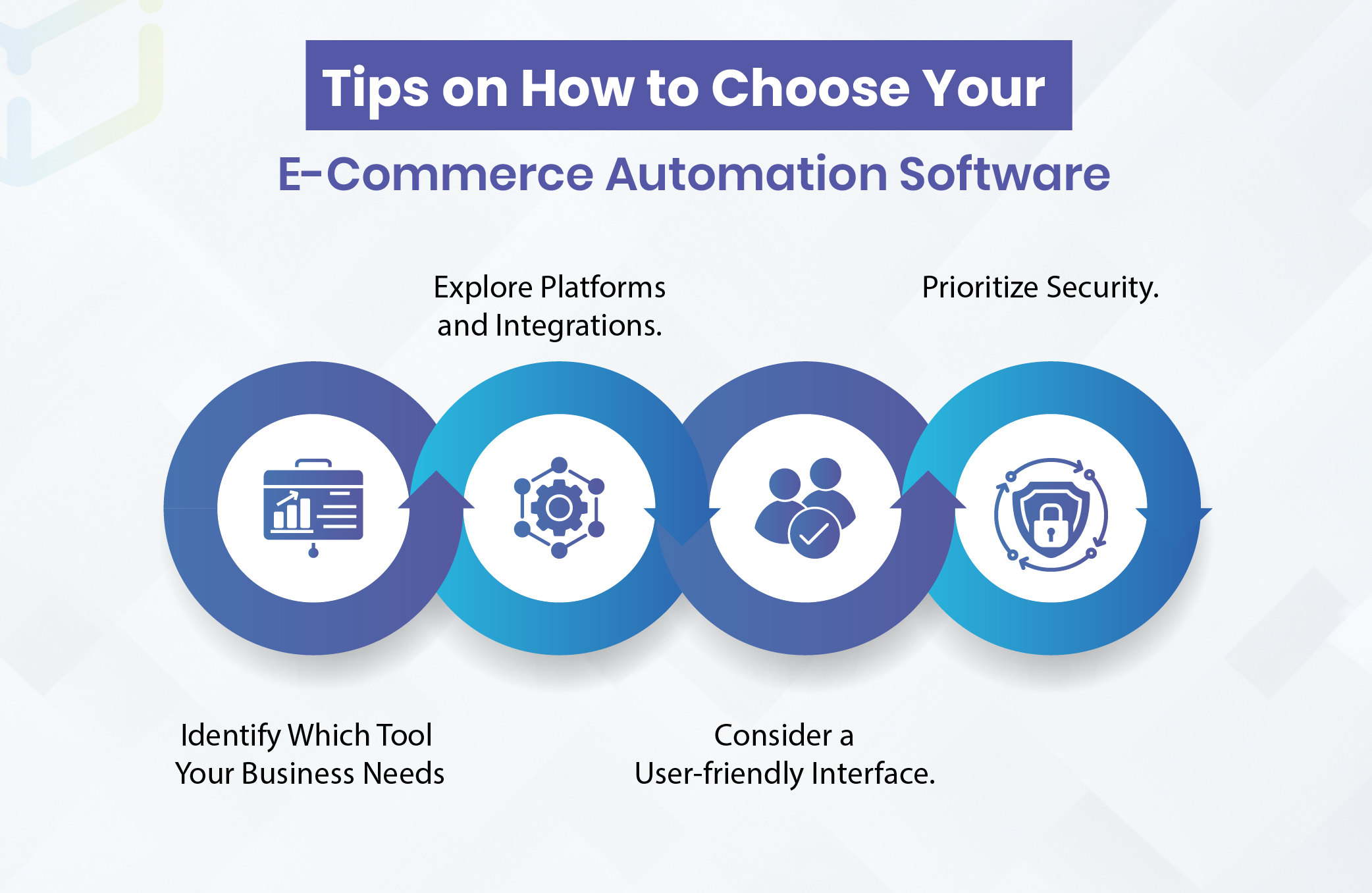
Let’s go through a few tips that might help you make an informed decision.
Identify Which Tool Your Business Needs
Before anything else, it’s crucial as a business owner to identify which automation tool your business needs the most and why.
Every tool comes up with its own features, so you need to know which features are essential to have and which are not so important.
Explore Platforms and Integrations
After you know what your business needs, it’s time to work on which integrations will fit in well. Investigate different e-commerce platforms and their available integrations.
Trango tech is offering various e-commerce integrations you can look into and make a firm decision which would fit well in your business.
Consider a User-friendly Interface.
Look for platforms that have a simple and easy-to-use interface. A simple interface with a drag-and-drop interface will go a long way for your e-commerce business.
Automation succeeds because it is easy for the team to understand. Choose an interface that is simple to set up and can launch campaigns with ease.
Prioritize Security.
The tools you are choosing must be encrypted and address all the privacy concerns beforehand. A customer must feel trusted while paying online using different automation tools.
Final Thoughts
The digital world needs digital business. It’s time for every e-commerce owner to invest in e-commerce automation software tools. These tools are not just a luxury anymore; they are becoming essential in 2025.
All automation tools help you streamline processes, save your time, cut costs, and deliver a seamless experience that maintenance customers retain as well.
In this blog, we covered 12 of the top e-commerce automation software tools you can use to grow your online store. At least start with any one of them, and you will see the difference yourself.
Automation not only runs your business more smoothly, but it also saves your time and resources while making the workflow even faster and more efficient.
Lastly, ecommerce automation services will give your business the freedom to focus on the things that need human expertise and that matter in your success.
Partner with WareGo to find automation software for your store.
Request a Free Demo Now!Frequently Asked Questions- FAQS
What is e-commerce automation?
E-commerce automation is a software solution platform to automate everyday and repetitive tasks such as order processing, inventory updates, and more. These tasks usually occur during the sale of goods and services on online platforms, and e-commerce automation helps to reduce online errors.
Which software is best for e-commerce?
There are many software’s for e-commerce, some of them are:
- Carthook
- Zapier
- Shopify Flow
- AutomateWoo
- Hunch
What is e-com and AI automation?
E-com refers to buying and selling goods online, and Ecommerce is totally digital-based. However, AI automation refers to the use of artificial intelligence to automate tasks. It can make decisions and handle tasks.
What is Shopify e-commerce automation?
Shopify e-commerce automation uses different software to automate repetitive tasks in an online store.
Automation of tasks such as:
- Cart abandonment recovery
- Inventory tracking automation
- Payment and invoicing automation
- Emails and SMS campaigns
